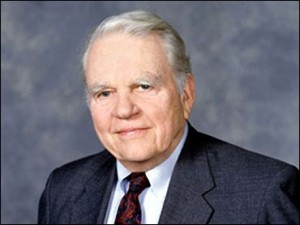Andy Rooney in 60 Minutes
Andy Rooney doesn’t do autographs. That’s the way it was and will be, even after he makes his last regular appearance on ’60 Minutes’ this Sunday. The ’60 Minutes’ commentator will discuss that policy and other aspects of his character that make him America’s favorite curmudgeon in a ’60 Minutes’ interview with Morley Safer to be broadcast Sunday, Oct. 2 at 7:00 p.m. ET/PT. On Sunday’s interview with Rooney, Safer points out that, yes, as people have wondered, Andy is the same way in person as he is on the air. “I say he’s exactly like that” – Safer tells Rooney. “I’ve been out with you, just walking the street and people come up asking for an autograph.” Rooney replies, “Oh, what kind of an idiot wants my name on a piece of paper?” Adding: “I still [don't sign them] and I have no intention of stopping. I just don’t sign autographs” – he tells Safer. Safer’s segment on Rooney will be followed by Rooney’s 1,097th ’60 Minutes’ essay – his last regular appearance on the broadcast.
This Sunday, the TV commentator and writer Andy Rooney will deliver his final weekly segment on ’60 Minutes.’ It will be his one thousand and ninety-seventh commentary for the show. Rooney began his career as an Army journalist during the Second World War, writing for Stars and Stripes in London—the same publication that spawned the lengthy publishing careers of Harold Ross and Alexander Woollcott. Rooney joined CBS as a TV writer in 1949, and there he frequently collaborated with Harry Reasoner, who would go on to help found ’60 Minutes,’ in 1968. Rooney’s unique style of satire—often involving whimsical commentary on trivial and everyday happenings—earned him a reputation as a latter-day Will Rogers. In 1978, Don Hewitt asked him to join ’60 Minutes,’ and Rooney, whom Morley Safer recently described as “having the demeanor of an unmade bed,” was an instant hit.
Nearly thirty years ago, E. J. Kahn published a sweeping two-part Profile of ’60 Minutes’ for the magazine, titled ‘The Candy Factory.’ In Part I of the series, Kahn recounted the methodology behind some of Rooney’s witticisms:
A turning point in Rooney’s television career came in the early nineteen-sixties, when he was trying to convince Richard Salant that he should be given a chance to write and act out some essays. Salant, who was standing near a door, asked what sort of stuff he could do. “I can do anything” – said Rooney. “I can do doors.” He did an hour on doors, and he has since also done, in two or three minutes apiece, soap, corner druggists, candy bars, parking places, and magazine-subscription inserts. “It’s a good thing television doesn’t have commercials we could tear out” – Rooney said in that last one. “The living-room floor would be a mess.”
Folksy is a tough sell in the age of Twitter, 24-hour news channels and Survivor.
Then again, Andy Rooney )whose folksy, often cranky essays for 60 Minutes have been a Sunday-night TV staple since 1978_ is 92. Time to hang up those suspenders, Larry King-style, and retire gently into that good night.
Rooney will announce on 60 Minutes tomorrow that this will be his last regular appearance on the broadcast.
He will make his announcement at the end of the program, during his 1,097th essay. It will be preceded by a segment in which Rooney will sit down with 60 Minutes regular Morley Safer, himself no spring chicken, at 79.
Safer, born in Toronto, got his first break with CBC News, before joining CBS in 1964. Together, the two will share old war stories, and Rooney will regale Safer (and the TV audience) with tales about the way it was.
60 Minutes has always drawn well in Canada, even though, in age and durability, W5 has been on the air longer. (Little-known, oft-misreported fact: W5 is the longest-running current-affairs program in North America, not 60 Minutes. W5 debuted in 1966; 60 Minutes launched in 1968. The fifth estate, the virtual new kid on the block, first aired in 1975. Now you know.)
60 Minutes has found an audience in Canada, in large part because, virtually alone among the major American newsmagazines, it frequently focuses on international news – and because, easy as they were to lampoon, Rooney’s weekly ruminations often touched on universal truths. Many of his essays began with the often imitated, oft-ridiculed opening, “Have you ever noticed how. . . ?”
Yes, we did notice.
Here are some of Rooney’s sayings over the years. Some are witty, some profound, some a bit of both. All bear repeating. Or reporting, if you prefer.
- “I didn’t get old on purpose. It just happened. If you’re lucky, it could happen to you.”
- “All men are not created equal, but should be treated as though they were under the law.”
- “Death is a distant rumour to the young.”
- “Computers make it easier to do a lot of things, but most of the things they make it easier to do don’t need to be done.”
- “If dogs could talk, it would take a lot of the fun out of owning one.”
- “Figure skating is an unlikely Olympic event, but it’s good television. It’s sort of a combination of gymnastics and ballet. A little sexy, too, which doesn’t hurt.”
- “Happiness depends more on how life strikes you than on what happens.”
- “I don’t pick subjects as much as they pick me.”
- “If you smile when no one else is around, you really mean it.”
- “Elephants and grandchildren never forget.”
